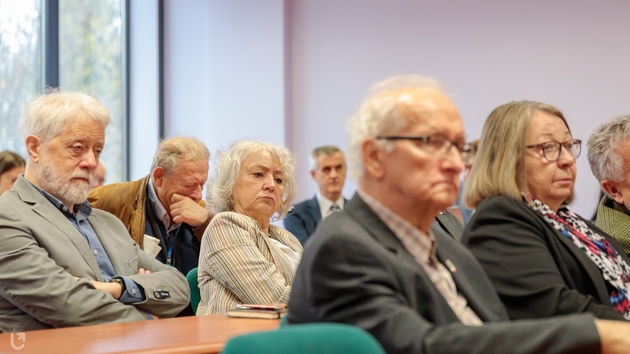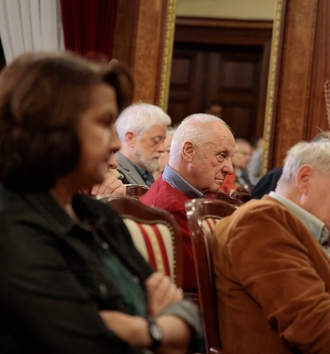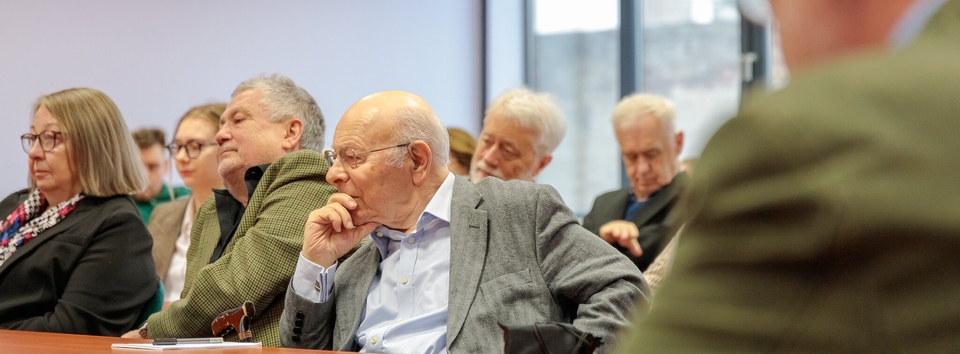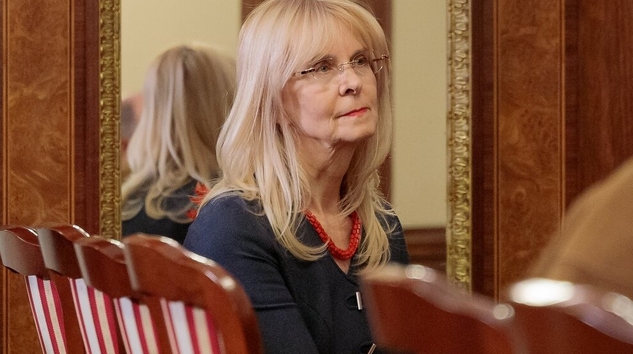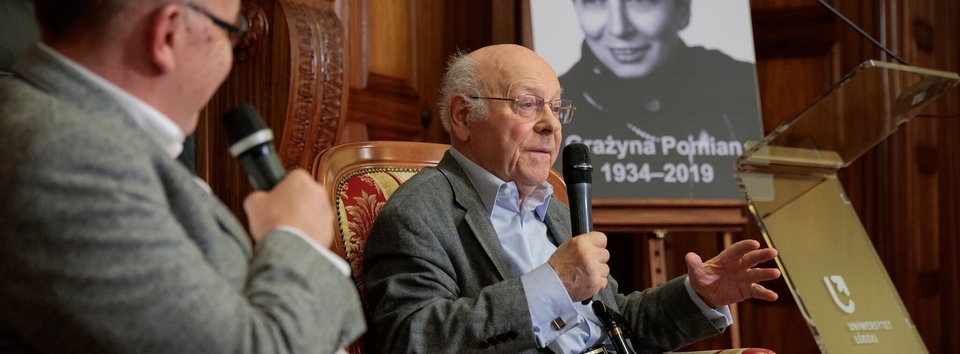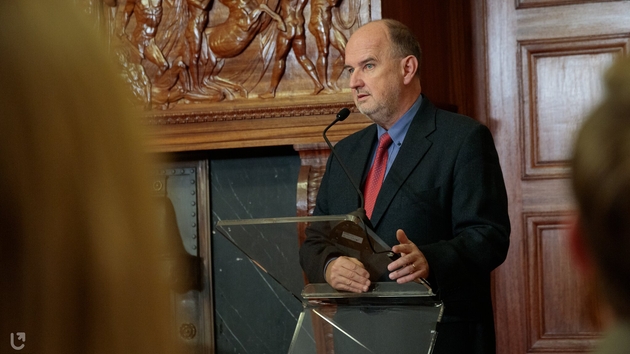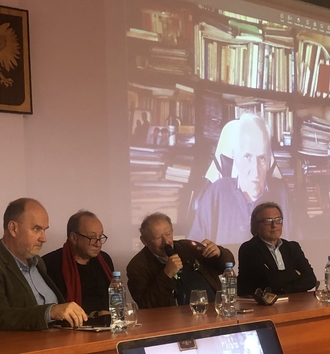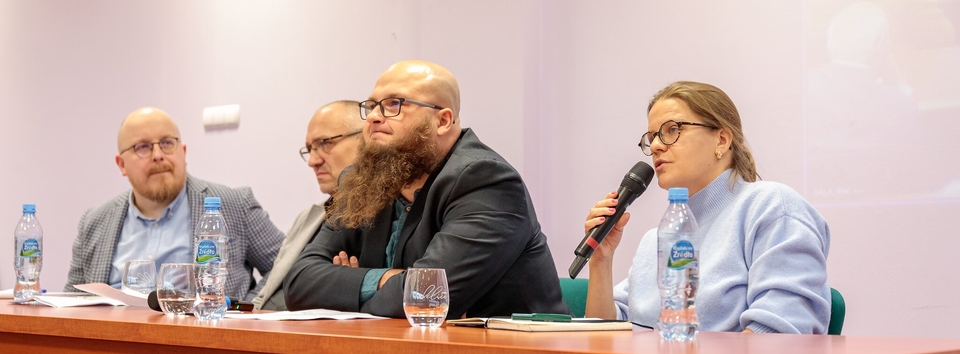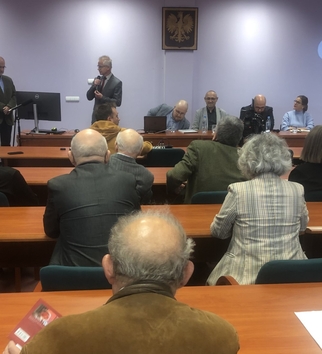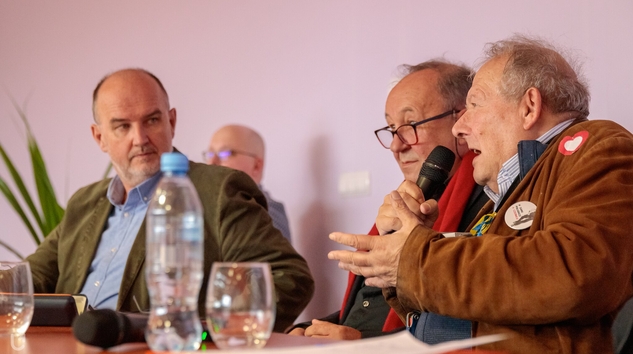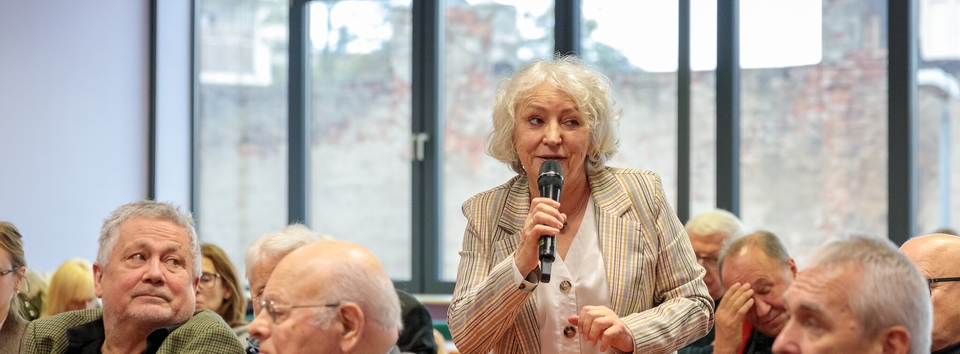We can only be happy that this is not the last event referring to the achievements and times of the Editor from Maisons-Lafitte and his Literary Institute. The organisers are already thinking about more such events.
There is nothing more natural in the life of a university than meetings of intellectuals who, regardless of their worldview, life experiences or research attitudes, want to jointly focus on the problems that intrigue them. They are even more desirable when theories that consciously disregard the previous findings of researchers appear in the public space that are formulated to achieve current political goals or are inspired by fashionable ideologies
– says Prof. Dr hab. Sławomir Nowinowski, Head of the Jerzy Giedroyc Centre, originator and organiser of the debates on the People's Republic of Poland.
Humanist in the Polish People's Republic
Prof. Nowinowski started the debates, welcoming the guests of these extraordinary meetings with the history of the Polish People's Republic at the university Biedermann’s Palace. At the beginning, a presentation of the monograph by a sociologist Grażyna Pomian (1934–2019) entitled "Bierut i jego partia" [Bierut and His Party] took place. The book devoted to the beginnings of the Polish People's Republic was presented by Prof. Iwona Hofman, a media scholar and the Head of UMCS in Lublin. She also introduced the author's profile. Then a conversation with Prof. Krzysztof Pomian, who is a philosopher and a historian, a researcher of the achievements of the Literary Institute, a close associate of Jerzy Giedroyc, Honorary Doctor of the University of Lodz, was led by Prof. Rafał Stobiecki (Institute of History of the University of Lodz, Jerzy Giedroyc Centre).
The discussion between the two scientists, and in fact the memories of Krzysztof Pomian, full of anecdotes, facts and people, concerned the situation of a humanist in the People's Republic of Poland in its most basic manifestations, i.e. the freedom of functioning of a scientist in a totalitarian system, the earnings in Polish science at that time, forms of social life and even ways of spending holidays.
Prof. Pomian also talked about his then fascination in philosophy with the thought of Leszek Kołakowski and the works of Bronisław Baczko, and in history – with Fernando Braudel. He pointed out the areas of both sciences that were not subject to oppression by the power apparatus of the time (e.g. Polish medieval studies at the European and even global level), and referred to the outstanding achievements of Polish sociology (Stanisław Ossowski) and history (Witold Kula) at that time.
It should be noted that the publication of Grażyna Pomian's book provided the impetus for organising the debate. However, the idea had already matured earlier, due to the fact that we are now witnessing a new wave of research on People's Poland, in which the leading role is played not by historians, but by representatives of other academic disciplines born after 1989
– adds Prof. Sławomir Nowinowski.
Disputes over the "People's Poland" modernisation project
The second day of debates on People's Poland, which were held at the Faculty of Philosophy and History of the University of Lodz, began with a panel on the topic "Social attitudes towards the People's Poland modernisation project of".with the participation of younger generation scientists. The fascinating, but not free from differences of opinion, discussion on the importance of the modernisation of the Polish People's Republic for individual social groups, its assessments and effects was attended by Prof. Marcin Zaremba (Faculty of History, University of Warsaw), Dr Magda Szcześniak (Institute of Polish Culture, University of Warsaw), Dr Andrzej Czyżewski (Institute of Political Studies, Polish Academy of Sciences, Jerzy Giedroyc Centre) and Dr Jan Olaszek (Institute of Political Studies, Polish Academy of Sciences PAN, Institute of National Remembrance, Jerzy Giedroyc Centre).
The audience listened to the analyses of the attitudes of Polish society towards the modernisation project (in the sphere of the economy, standard of living, taking into account the religiosity and xenophobia of Poles), as well as the arguments of scientists who sometimes present a very different view on this issue at the packed-full Hall of the Council of the University of Lodz Faculty of Philosophy and History.
The series of debates on People's Poland was not intended to summarise the ongoing dispute about the sense and significance of 45 years of communism on the Vistula River. The debates were to bring this dispute to a scientific level, reminding us of the rules according to which it not only can, but should be conducted: listening carefully to the arguments of adversaries, not exaggerating or blurring the difference in positions, and above all, firmly sticking to the realities
– explains Prof. Sławomir Nowinowski.
The place of the Polish People's Republic in the history of Poland – scientifically and from personal experience
A panel on the place of the Polish People's Republic in the history of Poland with the participation of outstanding historians and witnesses of history constituted the series of debates culmination. It was attended by:
- Prof. Andrzej Friszke (Institute of Political Studies of the Polish Academy of Sciences) who is a historian, whose works on the history of the People's Republic of Poland and the Polish independence emigration are essential reading for researchers of this epoch, a lecturer at Collegium Civitas, a corresponding member of the Polish Academy of Sciences and the Polish Academy of Arts and Science and a winner of the Memorial Prize of the First Rector of the University of Lodz Professor Tadeusz Kotarbiński.
- Prof. Dariusz Gawin (Institute of Philosophy and Sociology of the Polish Academy of Sciences) who is a historian of ideas and a philosopher. He is a researcher of the relationship between politics and Polish literature and of social thought in the era of the People's Republic of Poland, a deputy director of the Warsaw Uprising Museum.
- Adam Michnik who is the editor-in-chief of 'Gazeta Wyborcza', a historian and an essayist. He has been a member of the democratic opposition since the 1960s, repeatedly imprisoned for his activities.
- Prof. Robert Traba (Institute of Political Studies of the Polish Academy of Sciences) who is a researcher of the history of Central and Eastern Europe and the Polish-German borderland, a co-founder of the "Borussia" Association and a long-time director of the Centre for Historical Research of the Polish Academy of Sciences in Berlin.
The participants in this part of the debates tried to define their attitudes towards the Polish People's Republic – from a personal and broader perspectives, from the position of a scientist-historian. They all experienced the Polish People's Republic with its oppression, humiliation and weaknesses, although they differ in terms of generation. From contemporary perspectives, they also tried to answer a somewhat key question: "Was the Polish People's Republic still the Polish State"? which was asked by Prof. Sławomir Nowinowski leading the discussion. The answers varied. Prof. Robert Traba: The Polish People's Republic is a state with limited sovereignty. Ed. Adam Michnik: The Polish state may be organised by very bad people, but it is still Poland. Prof. Andrzej Friszke: I think similarly to Adam, but I think that today we should be humble towards the understanding of our situation by the people of that time.
When it comes to the memory of the Polish People's Republic, the voice of Prof. Friszke, who postulates a departure from rigid and principled historical assessments of this period and a more empathetic approach to the past, taking into account the limits and choices of the Polish people of that time.
The presence of such outstanding experts on the meanders of the history of the Polish People's Republic made the discussion (although at times very specialised) truly fascinating, not without literary values and high-class humour. It is to be hoped that the interpretations outlined during it will soon be developed in the form of books and articles, and the shattered myths will finally cease to persist on the pages of textbooks as well as on TV screens
– Prof. Sławomir Nowinowski from the Jerzy Giedroyc Centre of the University of Lodz sums up the series of debates on People's Poland
Photo report of the Debates on People's Poland – day 1
Photo report of the Debates on People's Poland – day 2
Source: Jerzy Giedroyc Centre, University of Lodz
Text and edit: Marcin Kowalczyk (Communications and PR Centre, University of Lodz)
Photos: Mateusz Kowalski (Faculty of Philosophy and History, University of Lodz)
Video: Adam Wróbel and Maciej Fornal (Communications and PR Centre, University of Lodz)

